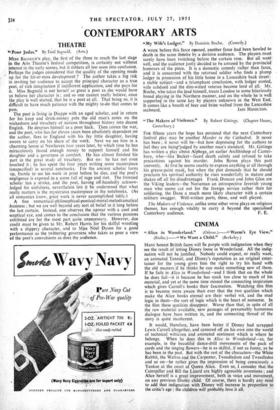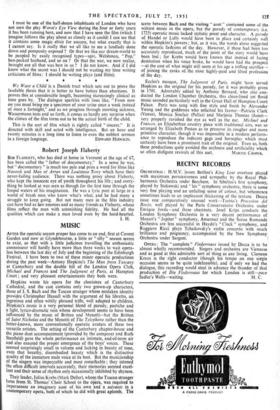CINEMA
Alice in Wonderland." (Odeon.)—" Worm's Eye View." (Rialto.)—" We Want a Child." (Berkeley.) MANY honest British faces will Se purple with indignation when they see the result of letting Disney loose in Wonderland. All the indig- nation will not be justified. Nobody could expect, or really want, an animated Tenniel, and Disney's reputation as an original enter- tainer for the young gives him the right to try his hand with the old masters if he thinks he can make something new of them. If he fails in Alice in Wonderland—and I think that on the whale he does fail—it is because he has stuck too close to much of his material, and yet at the same time missed the connecting inspiration which gives Carroll's books their fascination. Watching this film is to become more aware than ever that the two qualities which make the Alice books eternal are their verbal wit, and the mad logic in them—the sort of logic which is the heart of nonsense. In the film these qualities disappear. Worse than that, in spite of all the raw material available, new passages of presumably humorous dialogue have been written in, and the connecting thread of the story is quite incoherent.
It would, /therefore, have been better if Disney had scrapped Lewis Carroll altogether, and careered off on his own into the world of technical witticism and animated sentiment which is where he belongs. When he does this in Alice in Wonderland—as, for example, in the beautiful dance-drill movements of the pack of cards and the singing flowers—he is as skilful, if not as funny, as he has been in the past. But with the rest of the characters—the White Rabbit, the Walrus and the Carpenter, Tweedledum and Tweedledee and so on—he rather gives the impression of being consciously a Yankee at the court of Queen Alice. Even so, -I consider that the Caterpillar and Bill the Lizard are highly agreeable inventions ; and Alice herself is a great improvement, both in voice and movement, on any previous Disney child. Of course, there is hardly any need to add that indignation with Disney will increase in proportion to the critic's age ; the children will probably love it all. I must be one of the half-dozen inhabitants of London who have not seen the play Worm's Eye View during the_ four or forty years it has been running here, and now that I have seen the film (which I imagine follows the play about as closely as it could) I can see that it contains some magic elixir for success, but what exactly that is I cannot say. Is it really that we all like to see a landlady done down and pomposity exposed ? Or that we like our dream-world to be peopled by easily recognised types—spiv, Welshman, "Pop," hen-pecked husband, and so on ? Or that the war, we now realise, brought (Mt all that was best in us ? I do not know. And if I did know what the secret was I should not be wasting my time writing criticisms of films: I should be writing plays (and films).
We Want a Child is a Danish tract which sets out to prove the laudable thesis that it is better to have babies than abortions. It proves this at considerable length, becoming increasingly clinical as time goes by. The dialogue sparkles with lines like, "From now on you must bring me a specimen of your urine once a week instead of once a fortnight," and as we progress through morning sickness, Wassermann tests and so forth, it comes as hardly any surprise when the climax of the film turns out to be the actual birth of the child.
This is the sort of film which is rightly called "sincere." It is directed with skill and acted with intelligence. But an hour and twenty minutes is a long time to listen to even the noblest sermon



































 Previous page
Previous page